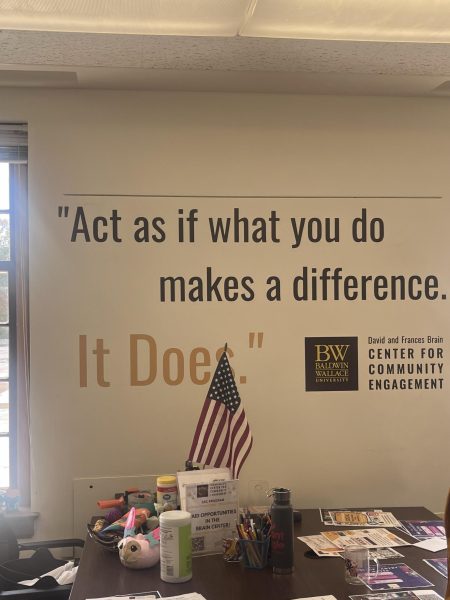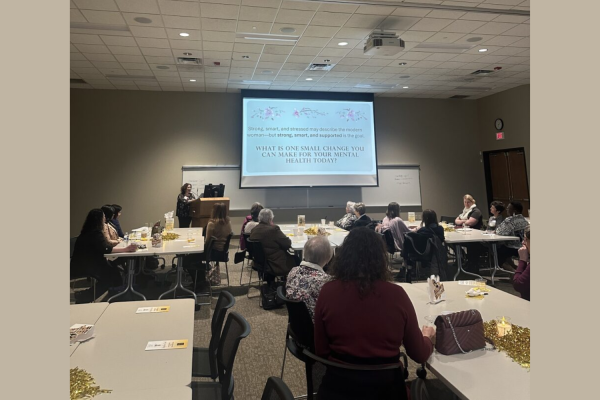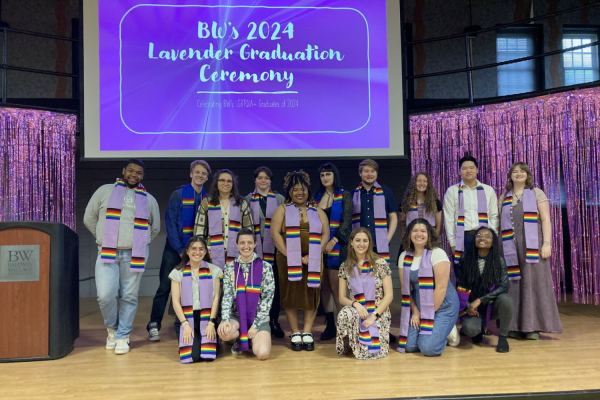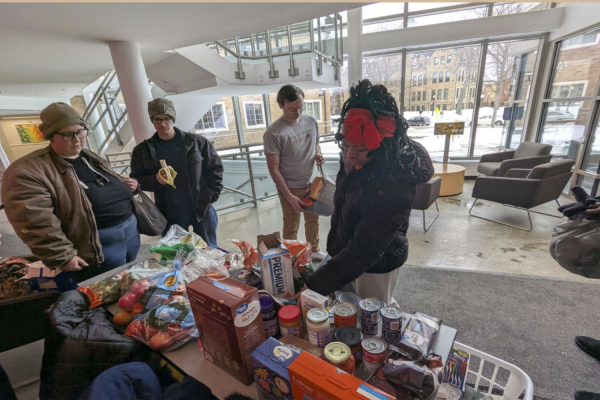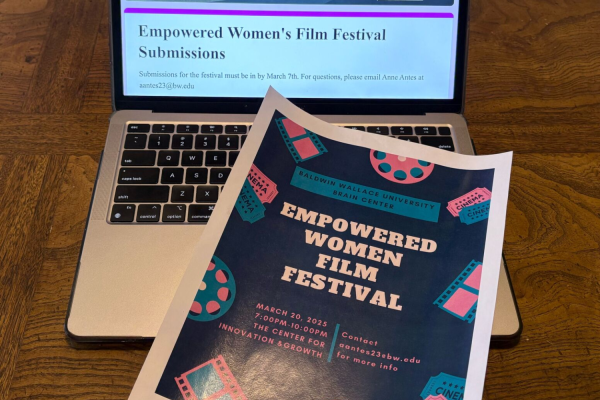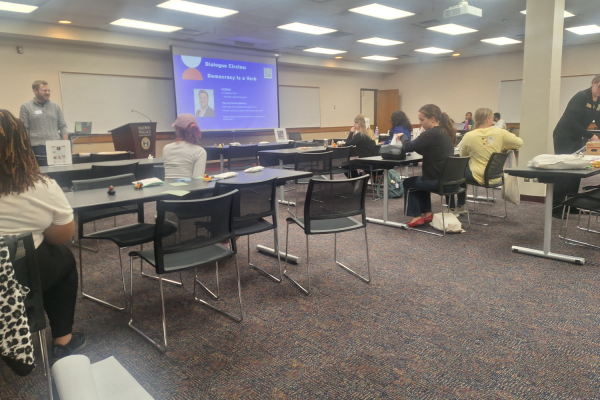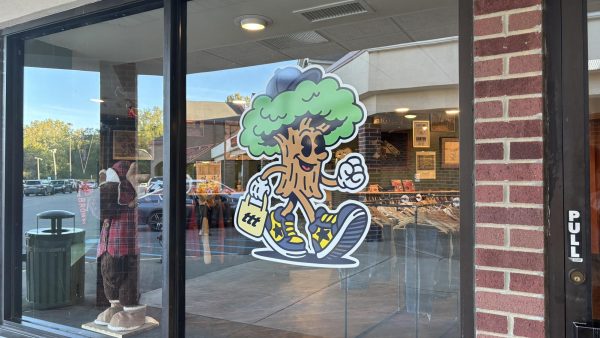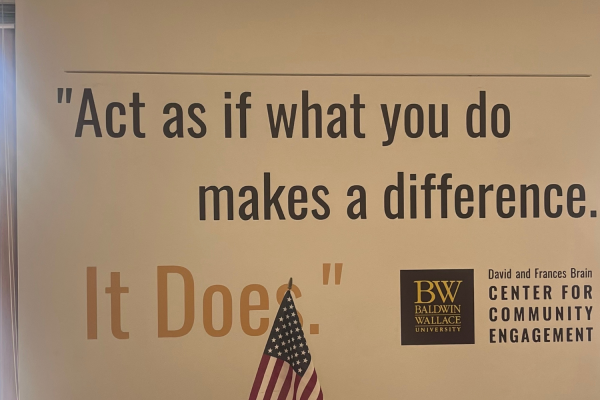Students share story of empathy to Playhouse Square with pop opera ‘Bare’
Baldwin Wallace musical theatre students perform pop opera “Bare” at Playhouse Square in annual partnership, exploring the differences between faith and religion while portraying a queer love story.
Baldwin Wallace musical theatre students bring vulnerability and operatic drama to Playhouse Square’s Helen Theatre with “Bare,” which premieres today at 7 p.m.
Directed by Laura Berg, the assistant professor of acting and directing in the musical theatre program, this production marks the 16th anniversary of BWMT and Playhouse Square’s annual spring partnership.
“Bare” is a pop opera that follows the relationship between Peter and Jason, two queer men attending St. Cecelia’s Catholic Boarding School. With a plot that mirrors the school’s production of “Romeo and Juliet,” the characters find themselves confronting their own identities.
“I think the central point of this story is the love that exists within this relationship that they are told is not right or, in this context, not Godly because it’s not the right kind of love,” Berg said.
Assistant stage manager Elise Hill said that “Bare” explores the differences between faith and religion and what that means for characters who are struggling to find their place in a society that has already judged them because of their identity and reputation.
“The show really debates the difference between [faith and religion] and helps you realize that love is love, no matter what your beliefs are,” Hill said. “I think it’s just the idea [that] you need to have faith in not just yourself but in the universe.”
Trevor Gill-Snow, a musical theatre student who plays Jason, said that their character fits into the “traditional box of masculinity” and must deal with the expectations placed on him because of how he presents himself and his successes while also “hiding the fact that he’s gay.”
Gill-Snow has been able to draw on their own experiences as a queer individual and said, “I think just the fact that people already assume what I am despite the fact that I identify as something else [is] something that I really draw on when I’m playing Jason.”
The cast and crew of “Bare” partook in a highly collaborative process with Berg, who crafted the production based on what she saw in the rehearsal room.
“I actually feel like my job as a director is similar to what I imagine that of a sculptor,” Berg said. “I basically get a giant block of marble, which is my cast and crew and design team, and then I just get to start shaping.”
This is Berg’s first directorial project within the musical theatre program. Gill-Snow said that they and the other cast members learned to utilize various acting techniques that they do not normally get a chance to practice.
“One thing the director has stressed a lot is stillness and acting, which I really respect. It kind of makes me think of film acting, and that’s something I really admire,” Gill-Snow said. “So having to use that genre of my acting technique is really fun.”
Berg said that it is a joy to work with a group of students who are playing students on stage because they can relate to that age group’s struggles, and she said it is important to have cast members who are part of the LGBTQ community share a story that is personal to them.
“I think that one of the most exciting things is just being a queer actor playing across from a queer actor in a queer love story. … It’s super fun to just be able to put that on a stage because there’s not a lot of shows that do that,” Gill-Snow said.
“Bare” is a pop opera, which means that, like an opera, the show is primarily sung-through, and the characters operate under very high stakes. The music in the show has a pop and rock influence.
“All of the stakes are really high the whole time,” Gill-Snow said. “The show was really written for the singing to be acted through, and the cast really does a great job of doing that, so I think it all adds together to be something really special.”
Because of its operatic basis, there is a list of trigger warnings, including religious trauma, homophobia, fatphobia, slut-shaming, drug use and overdose, sexual scenes, parental abuse and neglect, strong language, use of slurs, suicide and teen pregnancy.
Collaborating with Playhouse Square allows the students to work in different spaces beyond their college campus and learn to adapt to new settings, and Hill said that she is very excited to work at Playhouse.
“For me, I just love being able to create in different spaces and being able to move from space to space,” Hill said. “So, moving from Kleist Dance Studio to Playhouse is going to be a big change and really challenging. But I know in the long run, I will learn a lot, and it’ll just be great for all of us to just expand our creativity.”
By performing at Playhouse Square, the story of “Bare” can be shared with a wider audience and aid in the theater’s mission to build empathy, which Berg said may be the “only hope we have of changing people’s minds.”
“As we become adults, we are forced to question the things that we thought were true, and so my big hope for the audience is that as they leave this experience, they are left questioning,” Berg said. “If we could inspire even one more person to become an ally in that fight, to understand how important it is to stand up to that level of … insidious oppression. That would be my dream.”
“Bare” runs from March 31-April 2 with evening performances and one matinee at the Helen theater in the Playhouse Square Center.
The Exponent is looking for financial contributions to support our staff and our newsroom in producing high-quality, well-reported and accurate journalism. Thank you for taking the time to consider supporting our student journalists.





























